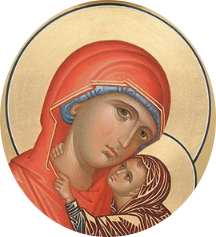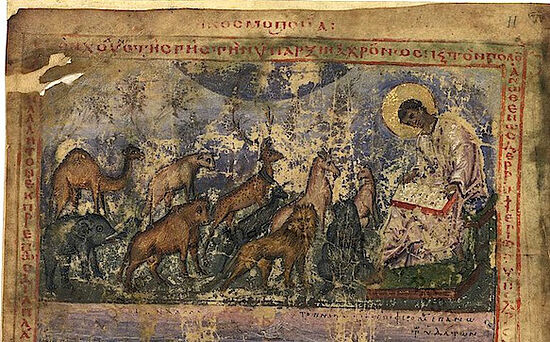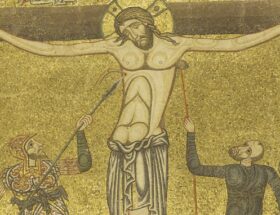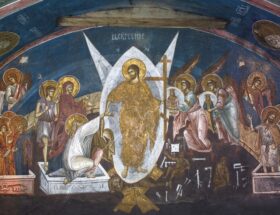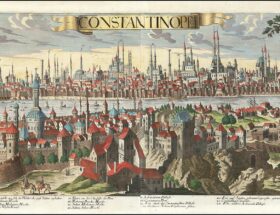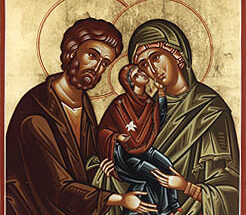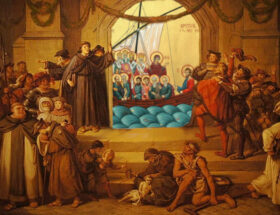Photo: Prophet Moses writing in Eden. Frontispiece to the book of Genesis in the Bible of Leo Sakellarios, Constantinople, A.D. 940.
Growing up in the USA at the end of the 20th century, I found myself living in a society lacking a coherent grand narrative. I attended public schools. These schools taught that the earth was billions of years old. They also taught evolution. The educational programming on television promoted the old universe and evolution as well. Almost every mainstream source of entertainment supported the same grand narrative. The fashionable opinion of the time was that humans are an insignificant byproduct of a meaningless chain of events in a purely materialistic universe. The grand narrative of post-modernism.
From my experience with adults and children in Protestant churches, the creation story was viewed as an anachronistic holdover from a time when people did not know any better. Points of view might range from completely fabricated mythology to a mystical way of explaining theistic evolution.
Why is a grand narrative important? Human beings need a strong foundation on which to build a successful life. A grand narrative is like a map showing all of history. The individual can point to where they are living on the map. It is as if there is an arrow pointing to “You Are Here” on the timeline of the universe.
Let us consider examples of grand narratives.
The cyclical grand narrative is one of the most common ancient cosmological beliefs. It can be found as the grand narrative of the Sumerians, Egyptians, Greeks, Indians, and even early Mesoamericans. The universe is a repeating rhythm — creation, decay, destruction, rebirth. The goal of life is to maintain balance and harmony within that cycle.
The linear grand narrative views history on a timeline. There is a beginning, a period of time for the narrative to play out, and an end. Moses in Genesis presents history as a sacred continuum unfolding under divine providence.
Both of these grand narratives give a person a sense of purpose for their lives. The cyclical universe views the universe itself as sharing aspects of divinity. The universe is eternal. Participation in the various cycles can lead people and societies to a sense of divine participation. It lacks a clear sense of purpose, and the eternality of the incarnation in this system makes one life on a given cycle not that important. A modern-day analogy could be made to the movie “Groundhog Day.” Every cycle, we are born and die without understanding why or how to get the stupid alarm clock to play something else.
Let me return to the grand narrative of post-modernism. The world is billions of years old in a universe that is billions of years older. Is this narrative linear? Is this narrative cyclical? Evolution posits that simple things are constantly evolving into things of higher and higher levels of complexity, or if you will, perfection. There is a massive contradiction within this narrative. Entropy is burning the proverbial candle of the universe at both ends, while evolution is somehow making systems progressively more complicated toward some type of perfection.
Ultimately, the grand narrative of the post-modern world is that there is no grand narrative. The universe needing to be billions of years old is required for the scientific explanation of its own presuppositional requirement of uniformitarianism. Evolution was a philosophical system created for the justification of the rule and explotation of more advanced societies and members of society over the poor and less powerful. This was mapped onto the predatory nature of the fallen world after the rejection of the Christian grand narrative.
Fundamentally, this is the reason that post-modern humanity is so mentally and spiritually bankrupt. Society has accepted a nihilistic grand narrative. The grand narrative is that there is no grand narrative. There is no purpose. There is no participation in anything divine or eternal. Each person creates their own meaningless narrative. We are all “Here,” and “Nowhere,” on the map of confusion.
What is so different about the Orthodox Christian Grand Narrative? The following passage is quoted from Saint Seraphim Rose, Genesis, Creation and Early Man Page 93-95.
“St. John Chrysostom in his Homilies on Genesis comes back again and again to the statement that every word of the Scripture is Divinely inspired and has a profound meaning-that it is not Moses’ words, but God’s.
Let us see now what we are taught by the blessed Moses, who speaks not of himself but by the inspiration of the grace of the Spirit.
He then has a fascinating description of how Moses does this. We know that the Old Testament prophets foretold the coming of the Messiah. In the Book of the Apocalypse (Revelation), St. John the Theologian prophesied about the events of the end of the world and the future of the Church. How did they know what was going to happen? Obviously, God revealed it to them. St. John Chrysostom says that, just as St. John the Theologian was a prophet of things of the future, Moses was a prophet of things of the past. He says the following:
All the other prophets spoke either of what was to occur after a long time or of what was about to happen then; but he, the blessed (Moses), who lived many generations after (the creation of the world), was vouchsafed by the guidance of the right hand of the Most High to utter what had been done by the lord before his own birth. It is for this reason that he begins to speak thus: “In the beginning God created the heaven and the earth,” as if calling out to us all with a loud voice: it is not by the instruction of men that I say this; He Who called them (heaven and earth) out of non-being into being it is He Who has roused my tongue to relate of them. And therefore I entreat you, let us pay heed to these words as if we heard not Moses but the very Lord of the universe Who speaks through the tongue of Moses, and let us take leave for good of our own opinions.”
Thus, we should approach the early chapters of Genesis as we would a book of prophecy, knowing that it is actual events being described, but knowing also that—because of their remoteness to us and because of their very nature as the very first events in the history of the world—we will be able to understand them only imperfectly, even as we have a very imperfect understanding of the events at the very end of the world as set forth in the Apocalypse and other New Testament Scriptures.”
The Orthodox Grand Narrative is not a philosophical or rational explanation based on thought experiments or materialistic analysis of the universe. The narrative is based on revelation from God to mankind. The fulfillment of hundreds of Old Testament prophecies was fulfilled with the coming of Christ. The God Bearing Fathers have made many other prophecies which have come true in the past, are happening now, and will continue to unfold in accordance with the divine revelation.
The narrative is also superior to the cyclic narratives in that we not only participate in the grand narrative, but we are given the opportunity to participate in the very life of the author of the grand narrative. The economy of creation, the economy of our life in this universe, the economy of our salvation, and the very purpose of our lives is to become what God is by nature, through uniting ourselves to the uncreated energies of God.
